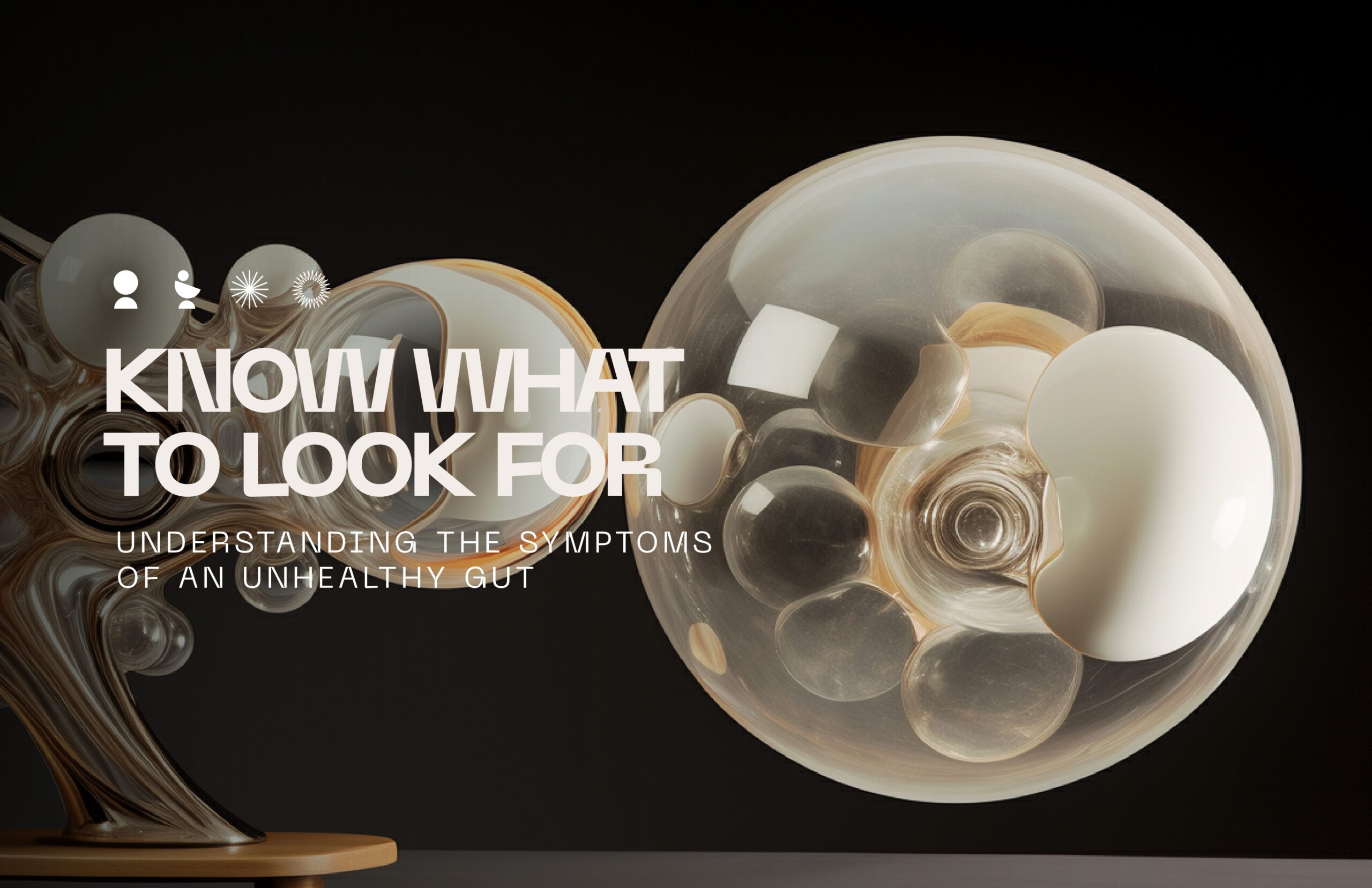Blog
How to have a happy gut

Contents
The gut microbiome and how it affects your health
The gut-skin axis
Why is a healthy gut important?
Signs of an unhealthy gut
How to help your unhealthy gut
Foods to promote gut health
Best supplements for gut health
Happy gut, happy life
Have you heard of the best supplements for gut health? Taking care of your digestive system is crucial to avoid damaging the rest of your body. Adding certain nutrients to your diet can aid in preventing further issues.
Your gut is your second brain, so caring for it is just as important as the rest of your body. There are several symptoms to look out for when diagnosing an unhealthy system. Specific foods may prevent or treat a damaged tract.
Discover the different signs of an unhealthy gut. Learn how to heal and repair a damaged digestive tract. Find the ideal foods and supplements to prevent and care for any issues you may have.
Let’s dive in.
The gut microbiome and how it affects your health
Doctors use the term gut microbiome to refer to microorganisms in your intestines. These gut bacteria can be good or bad. You have around 200 different species living inside you. These viruses, bacteria, and fungi all act in taking care of your digestive tract.
Some microorganisms damage our health. Aim to have plenty of good bacteria in your body. This variety reduces the risk of inflammatory bowel disease (IBS) and psoriatic arthritis.
How does this microbiome affect your health? Researchers are studying the importance and complexity of your gut. They link their research to your overall health.
These are a few links researchers found between your health and gut health:
- The immune system
- Autoimmune diseases
- Gastrointestinal disorders
- Cancer
- Mental health
- Endocrine disorders
- Cardiovascular disease
Studies show that a high level of bacteria diversity positively affects health. Your gut plays an essential role in your entire health and well-being.
The gut-skin axis
Have you heard of the gut-skin axis? Studies show that there’s a link between skin health and gut health. Some patients who have digestive issues may develop acne and other skin problems. One who had inflammatory bowel disease had skin lesions.
Researchers are continuing their studies daily to understand the gut-skin axis further. Lifestyle changes can help patients overcome gut issues and, subsequently, skin issues.
Why is a healthy gut important?
Some consider the gut to be the basis of health in your body. It’s the starting point where your body absorbs nutrients. Your gut is the location where your system creates neurotransmitters and hormones. Neurologically, your nervous system connects and regulates the gut.
Scientists use advanced and thorough testing to find the root cause of gut issues. They can then repair and heal the gut. Doctors build a foundation in your digestive system for other health optimization.
Signs of an unhealthy gut
Aim to analyze your symptoms to determine if you have an unhealthy gut. Spotting these issues early on can save you a lot of future trouble.
One of the critical signs of an unhealthy gut is rapid weight loss or gain. Research peptide therapy for weight loss if you want to lose weight.
High sugar diet
Lots of sugar is never a good thing. This compound can lead to several health issues. A diet of processed foods can negatively affect the good bacteria in your gut.
Sugar can cause increased inflammation throughout your body, not just your gut. These issues may lead to an array of diseases, including cancer.
Upset stomach
Stomach problems like a leaky gut can show an unhealthy biome. Track your symptoms to see if you align with an upset stomach.
Here are some signs you can identify:
- Bloating
- Diarrhea
- Constipation
- Heartburn
- Gas
Sleep disturbances/fatigue
Researchers found that an unbalanced gut can cause sleep disturbances and fatigue. The unregulated bacteria may cause short sleep durations and fragmented rest. These issues result in chronic fatigue.
Scientists are still unsure why an unhealthy gut causes sleep issues. They suspect it results from metabolic function, inflammation, and declining mental health.
Skin irritation
Psoriasis and other skin conditions can relate to unwanted bacteria in your gut. Too little of good organisms may negatively affect your body’s immune system.
Unintentional weight changes
Losing or gaining weight unintentionally is a sign of an underlying issue. You may have an unhealthy gut if your weight fluctuates without exercise or diet changes. Follow tips for maximizing weight loss if you aim to be skinnier.
Your body can’t regulate blood sugar, store fat, and absorb nutrients if you have an unbalanced gut. Small intestinal bacterial overgrowth can cause malabsorption of nutrients. You may have insulin resistance, which causes increased inflammation.
Autoimmune conditions
Understand the importance of knowing your genetics. You may have gut issues if you have an autoimmune condition. A bad gut microbiome may cause inflammation and disrupt your immune system.
Autoimmune conditions cause your body to attack itself. Your immune system doesn’t fight off harmful invaders.
Food allergies/intolerances
Everyone has the same question: should you eat gluten? The best way to determine if you should cut out gluten is to understand if you have an allergy or intolerance.
An adverse immune system reaction to certain foods means that you have an allergy. You have an intolerance if your body has difficulty digesting specific foods. Different intolerances may have to do with poor-quality bacteria in your gut.
How to help your unhealthy gut
Now begs the question: how can you help your unhealthy gut? A great tip is to look up books on gut health. Do deep research on how to save your damaged stomach.
There are a few methods you can follow to help your unhealthy gut. From IV treatments to changing your diet, let’s discuss these tips and tricks.
IV treatments
Finding helpful IV treatments is a great way to ease your unhealthy gut. Administer nutrients directly into your system, improving your gut health.
Opt for nutrients like zinc, calcium, magnesium, and glutamine. These all support your liver and gut health, replenishing and detoxifying your body. A healthy gut microbiome results in a boost in immunity and easy digestion of food.
Resolve your nutritional imbalances by taking part in IV therapy. Notice an instant improvement relating to your negative symptoms of poor gut health.
Peptide therapy
You may wonder, how can peptide therapy help improve gut health? Specific peptides provide anti-inflammatory properties. They may reduce gut swelling and heal inflamed tissue. These compounds speed up healing by improving blood flow to the intestines.
Get enough sleep
Not enough sleep is damaging to your entire body. Lack of rest affects your brain function but also decreases your gut health. An uncomfortable feeling in your stomach can also cause increased sleep issues.
Experts encourage people to focus on getting at least 7–8 hours of sleep. Contact a doctor if you find you have difficulty resting at night.
When you have a good night’s rest, your body creates a more diverse microbiome. It also releases neurotransmitters designed to improve your mood.
Lower your stress levels
It may sound impossible, but a great way to promote gut health is to lower your stress levels. Chronic worries attack your entire body, not just your mind.
Here are a few ideas on how to lower your stress levels:
- Yoga
- Walking (fresh air)
- Meditating
- Massage therapy
- Laughing
- Calming essential oils
- Surrounding yourself with friends and family
- Limiting how much alcohol you consume
- Spending time with your pets
The gut and the brain work hand-in-hand. A healthy gut can cause your brain to release positive neurotransmitters like serotonin. These compounds help elevate your mood and improve digestive health.
Anxiety and stress may cause digestive issues or even worsen existing symptoms. An unhealthy gut sends signals to your brain that promote depression and stress.
Some researchers refer to the gut as the “second brain.” It comprises millions of nerve cells that control digestion. When you stress eat, you can develop symptoms like bloating. Your body focuses on “flight or fight” instead of the needed digesting process.
Stress, depression, and anxiety can even cause constipation, which indicates an unhealthy gut. Worried emotions may trigger hormones that result in irritable bowel syndrome.
Eat slowly
You may significantly lower your chances of diabetes if you chew your food properly. Practice eating slowly to improve the way your gut digests food.
You feel less discomfort if you work on taking time to chew your food. Eat slowly to maintain a healthy and balanced gut.
Stay hydrated
Understand the importance of water when working on your gut health. Research shows that those who drank more water during the day had less negative bacteria. Without the harmful organisms, they were less likely to contract gastrointestinal infections.
Staying hydrated provides several health benefits, not just for your gut. Easily prevent constipation by drinking roughly three liters of water daily.
Test for food allergies/intolerances
Have you ever wondered if gluten is good or bad? This substance is detrimental to your health if you have an allergy to it. Taking intolerance tests is crucial in keeping your body in tip-top shape.
Here are a few symptoms you may have that show an intolerance or allergy:
- Abdominal pain
- Bloating
- Gas
- Fatigue
- Acid reflux
- Diarrhea
- Nausea
To test for allergies or intolerances, cut foods you suspect may cause these symptoms. Identify and avoid damaging foods to improve gut health.
Coeliac disease is an autoimmune condition where your body attacks gluten. You can find this substance in wheat, barley, and rye. This process damages your small intestine, causing digestive issues.
Change your diet
Your first step in changing your diet is to ditch the gluten. Improve your health by removing this substance from your daily food intake.
Do research on what foods can promote gut health. Some include:
- Vegetables
- Tea
- Fruits
- Coffee
- Wine
Research points towards a FODMAP-free diet to help improve gut health. FODMAP represents fermentable oligosaccharides, disaccharides, monosaccharides, and polyols. Avoid pears, apples, cabbage, and milk.
Foods to promote gut health
The next step is to find foods that promote gut health. Look out for ingredients to help leaky gut, as they’re always beneficial. Finding specific food is an excellent alternative to changing your lifestyle.
Some foods specifically aid in easing discomfort in the gut. They may even repair the damage done or prevent it altogether. From fiber to fermented food, let’s discuss the best products for increased gut health.
High fiber
Fiber is a popular ingredient to promote gut health. It can easily pass through the digestive system of plant foods and reach the colon. Bacteria then break down the fiber into short-chain fatty acids.
Butyrate, one of the fatty acids, provides energy for cells in the colon. This compound may even help prevent colon cancer.
High-fiber foods include:
- Whole grains: oats and quinoa.
- Nuts: pistachios and almonds.
- Legumes: chickpeas and black beans.
- Fruits: peaches and apples.
- Vegetables: asparagus and broccoli.
Garlic
A study in 2019 showed that, in mice, garlic may increase the diversity of microbiomes in your gut. This process improves your gut health.
Garlic is excellent for digestive health. Its potent properties ease several issues you may have in your digestive system. It produces good bacteria, resulting in positive effects. Garlic might help with indigestion, gastroesophageal reflux disease, and irritable bowel syndrome.
Collagen-boosted food
Collagen is a hot topic lately, and it’s no surprise why. Foods rich in this protein may benefit the gut and general health. Collagen supplements might boost the gut microbiome.
Here are a few foods rich in collagen:
- Broccoli
- Citrus fruits
- Meat
- Nuts
- Eggs
Collagen makes up your nails, skin, hair, and connective tissue. It’s a protective layer that covers organs like kidneys. Diets including collagen can protect and soothe the gut lining, building new tissue.
Fermented food
Aim to eat fermented food daily. These bacteria crowd and fight out the harmful compounds in your gut. Your intestines end up with a healthy balance of bacteria.
Here’s a list of fermented food:
- Kimchi
- Kefir
- Tempeh
- Sauerkraut
- Kombucha
- Miso
- Yogurt
Yogurt, in particular, is an excellent addition to your diet. Active cultures improve digestion if you are lactose intolerant.
Best supplements for gut health
It’s vital to understand the best supplements for gut health. You can take these products if other methods don’t help repair your gut.
Several supplements can ease gut pain or increase general health. Some of the most well-known ones are L-glutamine and probiotics.
Probiotics
We define probiotics as live microorganisms. These cells interact with your body’s natural microbiota, often restoring balance. Foods rich in probiotics include several fermented products like yogurt or kimchi. Even pickles contain these microorganisms.
Prebiotics
Prebiotic fiber foods are non-digestible and may be helpful to your gut. These products pass through your GI tract without your gut digesting them.
Since our bodies don’t metabolize prebiotics like everyday foods, our gut bacteria do the work. The organisms metabolize the supplements into short-chain fatty acids. These compounds help our body perform different necessary tasks.
Here are a few examples of foods high in prebiotics:
- Bananas
- Garlic
- Onions
- Artichokes
- Honey
- Oats
- Asparagus
Digestive enzymes
Digestive enzymes are proteins that encourage your body to break down food in your digestive tract. Your pancreas, small intestine, and stomach produce these compounds. Some people don’t create enough enzymes, resulting in indigestion, gas, and bloating.
Supplements to promote digestive enzyme production improve general gut health. They aid in breaking down food in your gut. These enzymes break down fats, lactose, carbohydrates, proteins, and fiber.
These are the primary enzymes you need to look out for to add to your diet:
- Protease
- Lactase
- Lipase
- Amylase
- Cellulase
L-glutamine
L-glutamine is another must-add to your supplement list to improve gut health. It’s an amino acid that promotes a healthy stomach. L-glutamine is the most prevalent amino acid in your body. Your system uses it to fuel cells along your digestive tract.
Glutamine strengthens your intestinal barrier, preventing harmful substances from contaminating your bloodstream. These supplements improve gut health by supporting the repair and growth of your intestinal lining.
Curcumin
Curcumin is a compound you can find naturally in turmeric, which is a spice commonly used in Indian food. This product has potent anti-inflammatory properties, which may help ease an inflamed gut.
This spice aids people with IBS, IBD, and leaky gut syndrome. It deactivates damaging compounds, helping close holes in your gut lining.
Researchers say that curcumin restores the gut biome. It positively influences the microbiota-gut-brain axis, boosting general health.
Vitamin C
Gut health vitamins are vital in repairing your system. Micronutrients are beneficial. They support and regulate energy metabolism, cellular growth, and immune function.
Vitamin C is an antioxidant that is vital in maintaining positive gut health. This supplement may reduce inflammation in your gut. By doing so, your gut barrier can better absorb nutrients from your food.
Add vitamin C-rich foods to your diet, like citrus fruits. Eat leafy, green vegetables for extra benefit. It helps balance the harmful and good bacteria to create a healthy environment in your gut.
Chamomile/Ginger
People have used the chamomile and ginger plants for centuries. Some say these herbs may treat digestive problems. They both aid in soothing the digestive tract and reducing inflammation.
Chamomile has proven to be an excellent stress reliever, promoting relaxation. Being more tranquil can help your body digest food efficiently.
Ginger has an antimicrobial activity that benefits the body. This supplement protects your gut from spoilage in foods and pathogenic microorganisms. It may also ease nausea and encourage your body to produce digestive enzymes.
Herbal supports
You can use the sugar substitute stevia to replace sugary foods that may harm your gut. Stevia activates bacteriophages, which live in the gut biome. These compounds are viruses that attack harmful bacteria.
Licorice is another herb that can aid in digesting food. Several people eat oregano to encourage bacteriophages to do their job.
Artichoke
Artichoke may help encourage your body to produce digestive enzymes. This vegetable might ease inflammation in your gut, boosting its health. You can find this supplement in a powder if you don’t like the taste.
Happy gut, happy life
A happy and healthy gut is one of the critical factors in a pleasant life. If your digestive system fails, it affects your mind as well. Paying attention to your gut’s health to improve your general well-being is essential.
Visit our website to find more health facts and tips. We discuss in-depth topics on peptide therapy, the next leading medical treatment.
Author: Dr. Jason Phan NMD – Founder of LIVV Natural – Anti-aging – regenerative medicine – peptide therapy


